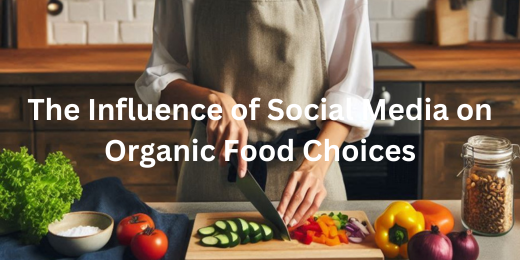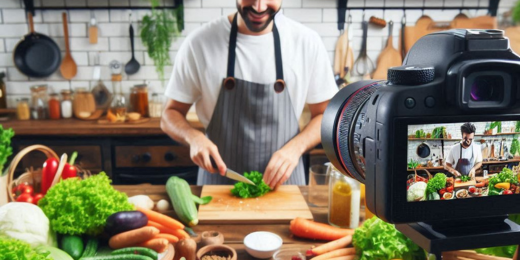
The Influence of Social Media on Organic Food Choices
Influence of social media on organic food
Rise of Organic Food Awareness
In recent years, the influence of social media on organic food has been remarkable. As people gain increased access to information about organic farming through platforms like Instagram and YouTube, there is a growing interest in health and wellness trends. Social media influencers play a significant role in organic food buying habits and social media, using their platforms to promote organic products.
This heightened awareness has led to shifts in organic food buying habits with many choosing organic products for health reasons. The visual appeal and storytelling capability of platforms like TikTok and Facebook make it easier for consumers to connect with the ideals behind organic farming, driving them to make informed purchasing decisions.
The impact of social media influence on organic food extends beyond mere awareness to tangible changes in consumer behaviour. As people become increasingly health-conscious, they are actively seeking out organic alternatives and sharing their experiences online. This trend not only boosts the demand for organic products but also fosters a community around sustainable living.
Social Media Platforms as Information Hubs
Social media platforms serve as information hubs for those interested in organic food. Platforms like Instagram and Facebook feature a plethora of posts and videos showcasing social media influence on organic food through recipes and meal ideas. YouTube channels dedicated to organic farming techniques provide detailed insights into sustainable practices, while blogs and online communities foster discussions about the influence of social media on organic food and its benefits.
These platforms not only disseminate information but also shape organic food buying habits and social media interactions. Users engage with content that promotes healthier eating choices, influenced by the visual appeal and accessibility of recipes shared on these platforms.
Bloggers and influencers play a crucial role in advocating for organic products, leveraging their reach to educate and inspire their followers towards more sustainable consumption patterns. As the digital landscape evolves, so too does the impact of social media influence on organic food. Consumers are increasingly turning to these platforms for guidance on adopting organic lifestyles.

Impact of Influencers and Celebrities
The influence of social media on organic food is amplified by celebrities and influencers who endorse organic brands. Their reach allows them to share personal stories and highlight the benefits of organic products, shaping organic food buying habits and social media trends.
Celebrities’ endorsements lend credibility to organic brands, influencing their followers’ decisions to embrace social media influence on organic food. Influencers, through authentic narratives, connect with audiences on a personal level, fostering trust in organic products. Sponsored content on platforms like Instagram and TikTok integrates seamlessly into users’ feeds, driving engagement and awareness about sustainable eating practices.
These partnerships not only raise awareness but also drive meaningful change in organic food buying habits and social media interactions. By leveraging their platforms, influencers and celebrities play a pivotal role in advocating for ethical and health-conscious choices.
Consumer Behaviour and Online Reviews
The influence of social media on organic food is evident in how consumer behaviour is shaped by online reviews. User-generated content, such as reviews and personal experiences shared on platforms like Amazon and Google Reviews, plays a crucial role in informing organic food buying habits and social media interactions.
Consumers rely on these firsthand accounts to make informed decisions about organic products. When individuals post about their positive experiences with organic foods on platforms like Facebook and Twitter, it resonates with their networks, influencing others to explore similar choices. Crowdsourced ratings and recommendations further validate these experiences, building trust among potential consumers seeking healthier alternatives.
Online reviews contribute significantly to the discourse around organic food buying habits and social media engagement. As more people turn to digital platforms for product information, the collective wisdom of user reviews becomes a powerful tool in advocating for organic foods. This dynamic interaction between consumers and social media platforms continues to shape trends towards sustainable and health-conscious lifestyles.
Trends and Hashtags
The influence of social media on organic food is underscored by popular hashtags like #OrganicLiving and #HealthyEating, which promote awareness and engagement around sustainable food choices. Viral trends on platforms such as TikTok and Instagram further boost social media influence on organic food, sparking widespread interest and adoption of organic products among users.
Hashtags play a pivotal role in amplifying the organic food buying habits and social media interactions. They facilitate conversations and community-building around organic living, connecting like-minded individuals and influencers who advocate for healthier eating. Viral trends often highlight innovative ways to incorporate organic foods into everyday diets, resonating with a broad audience seeking inspiration and information on sustainable nutrition.
The promotion of seasonal and local organic food trends online aligns with consumer preferences for fresher and more environmentally sustainable choices. Social media platforms provide a dynamic space where food enthusiasts can discover and share recipes, tips, and benefits of choosing organic options. This digital ecosystem not only drives awareness but also empowers individuals to make informed decisions that support their health and the planet.
Challenges and Misconceptions
Navigating the landscape of social media influence on organic food presents challenges, including widespread misinformation and myths about organic products. On platforms like Facebook and Instagram, conflicting information can lead to misconceptions about the health benefits and production methods associated with organic food, making it crucial for consumers to research and verify claims.
Verifying the authenticity of organic labels remains a significant hurdle for conscientious shoppers. With numerous certifications and varying standards, discerning genuine organic products from misleading labels can be complex. This challenge is amplified, where diverse market offerings and regulatory oversight may differ from global standards.
While demand for healthier alternatives grows, limited availability and higher prices can deter widespread adoption. Addressing these barriers requires efforts to promote local organic farming initiatives and enhance affordability through market incentives and consumer education. For more information on organic food and farming, visit your nearest Uyir Organic Farmers Market or explore online at www.uyironline.in or www.uyirorganic.farm.